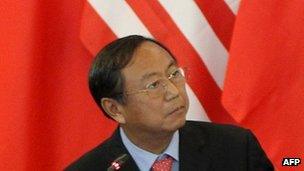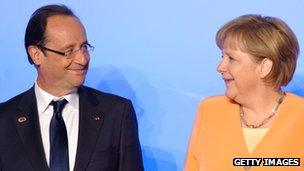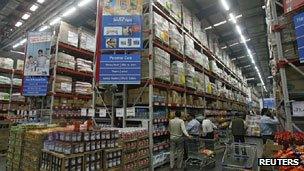Protectionism: Is it on the way back?
- Published

The US and Colombia have enacted the world's latest free-trade deal
As the global economy continues to face tough times, governments are increasingly playing politics with trade and giving in to protectionism.
Says who? Well, Chinese officials, as it happens.
Earlier this year, China's top promoter of foreign trade, Wan Jifei, said rising protectionism was having a negative impact.
"Trade protectionism is shortsighted and narrow-minded, and it cannot fundamentally address the problems of unemployment and economic growth worldwide," said Mr Wan, who is president of the China Council for the Promotion of International Trade.
"Free trade is the engine of national economic growth," he added.
His view was backed by President Hu Jintao, who praised the council's role in countering protectionism.
Trade tussles
Now, you might think it a bit rich for China to denounce such measures, given that Beijing is routinely accused by others of protectionist behaviour.
Most recently, US President Barack Obama has alleged that China illegally subsidises exports of cars and car parts, thus forcing US manufacturers to shift production overseas.
On the other side of the US political fence, anti-China sentiment is also strong. The Republicans' Mitt Romney has pledged to declare China a "currency manipulator" if he is elected president in November, reflecting the anger felt by many Americans over what they see as the deliberate undervaluing of the yuan to favour Chinese exporters.

Wan Jifei fears other people's protectionism
China is already facing several cases at the World Trade Organization (WTO), including one brought jointly by the US, the EU and Japan over its restrictions on rare earth exports.
On the other hand, China also sees itself as a victim of protectionism. In an effort to alleviate the pressure, it has begun talks with Japan and South Korea on a free-trade pact.
Some observers think the US should put its own house in order before it starts calling other nations protectionist.
After all, one proposal on the "to-do list" that President Barack Obama presented to Congress in the spring was a 20% tax credit for firms that relocate jobs to the US from abroad.
But the US can also point to fresh progress on trade liberalisation after its long-delayed free-trade deal with Colombia finally took effect in May.
Even so, fresh bilateral trade disputes between the US and China keep emerging.
In another row, Washington has slapped anti-dumping tariffs on Chinese solar panels, which it says are being sold at unfairly low prices. China denounced the move as protectionist, but the EU has also now begun an anti-dumping investigation into the trade.
EU tensions
It seems that free-trade and protectionist tendencies are fairly evenly balanced among the great powers, with every nationalist impulse countered by a liberalising one.
This "one step forward, one step back" behaviour can be seen in the EU as well, beset as it is by the crisis in the eurozone.

The French and German leaders have differing views on protectionism
The recent French presidential election saw both the successful challenger, Francois Hollande, and the defeated incumbent, Nicolas Sarkozy, stepping up their protectionist rhetoric in an effort to woo the 80% of voters who are anti-globalisation.
However, as has often been stated beyond the country's borders, France is a big winner from globalisation, with French companies doing 14 times more business abroad than foreign firms do in France.
Mr Hollande has said he wants French financial aid to go to exporters of French products.
But if he is serious about his campaign promise to create 150,000 new jobs in France, many analysts feel he will have to promote more competition in the economy, not less - in other words, more liberalisation and less protectionism.
In any case, the German Chancellor, Angela Merkel, has long maintained that a return to protectionism would be a grave danger for the global economy, making it unlikely that Mr Hollande will get his way at a pan-European level.
'Fortress Mercosur'
Other regions of the world, notably Latin America, are similarly blowing hot and cold in the same trade debate.
In retrospect, the 2005 collapse of the ambitious Free Trade Area of the Americas (FTAA) plan, which would have included all 34 of the hemisphere's democracies, marked the global turning of the tide against wholesale trade liberalisation.
Not long afterwards, the Doha world trade talks, held under the auspices of the WTO, entered their current moribund state, dispelling hopes of lowering trade barriers around the world.

Argentina's president is seeking to protect the country's industry
Now Argentina is spearheading moves in South America's biggest economies to batten down the hatches and fend off imports from outside the region.
Argentina and Brazil are the most powerful members of the Mercosur trading bloc, which also includes Paraguay and Uruguay.
Argentina has proposed to Brazil that the external tariff levied on goods from outside the Mercosur region should rise from 10% to 35%, the maximum allowed under WTO rules.
At the same time, the cash-strapped government in Buenos Aires is desperate for Brazil to buy more of its goods and is pressing Brasilia to remove its import barriers to certain Argentine goods, including pharmaceuticals and citrus fruits.
Argentine President Cristina Fernandez's economic nationalism recently manifested itself in her government's expropriation of Spanish-controlled oil company YPF.
Now her "fortress Mercosur" approach is demonstrating why some economists think trade blocs, or indeed bilateral trade agreements, do not actually promote free trade but merely divert existing trade.
Access to markets
India, too, is facing both ways on the issue. Recent comments by Indian politicians have echoed those of China in denouncing protectionist sentiment, particularly on the part of the US.

India's $500bn retail market is still not fully open to foreign firms
But India is still reluctant to give foreign firms greater access to its economy, as shown by the political row over its much-delayed decision to open up the supermarket sector to global giants such as Wal-Mart, Tesco and Carrefour.
Single-brand firms such as Starbucks and Ikea are already allowed to open stores in India, but only provided they buy 30% of their goods from domestic small industries.
From the perspective of the UK, such restrictions are frustrating. The list of British companies that have passed into foreign ownership is endless, from Cadbury's to Jaguar Land Rover.
Yet while Foreign Secretary William Hague has pledged to "argue relentlessly" around the world in favour of free trade and against protectionism, UK firms seeking to make acquisitions abroad do not always have reciprocal access to those foreign investors' home markets.
'Progressive' protectionism?
At the same time, some commentators in the UK are now beginning to wonder openly whether protectionism is such a bad thing after all.
The left-wing Compass pressure group caused a stir when it published a paper, external arguing that globalisation was "the underlying cause of today's economic and social malaise" and that "progressive protectionism" was the answer.
This is defined as "encouraging and allowing countries to rebuild and rediversify their economies by limiting what goods they let in and what funds they choose to enter or leave the country".
This prompted a heated response, external from a senior fellow at a free-market think tank, the Adam Smith Institute, who described the idea as "fascist economic policy" that was "stuck in some sort of 1700s mercantilist time warp".
But given the current ambivalent mood of politicians and voters alike in the face of global economic crisis, a return to widespread protectionism can hardly be ruled out.
- Published17 September 2012
- Published17 September 2012
- Published15 May 2012
- Published14 May 2012
- Published11 January 2012